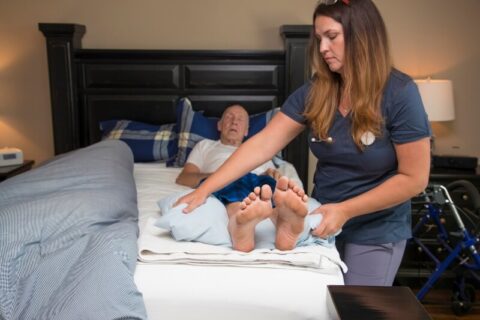How to Get Hospice Care at Home
When people near the end of life, it is an overwhelming, emotional, and confusing time for individuals and their families. In many cases, they are not sure how to get care, and may not even realize that they could benefit from hospice services. Some people are afraid to even mention it, and often, people will wait for a physician to initiate the topic of hospice care, not knowing that they can access hospice care on their own in many cases. Often, people who are eligible for hospice care do not access it early enough, and individuals and families are left feeling that they wish they had known earlier about this eligibility. Hospice care is not meant to extend or shorten life expectancy, but it can be a valuable aid in improving the quality of life for someone whose time is short. Since many people do not know how to get hospice care at home, we would like to offer some advice on how to proceed.
Speak Up
If you know that you or your loved one will be interested in hospice when the time comes, let the healthcare providers know this early on in a life-limiting illness. If your loved one is the one who is sick, discuss the possibility of hospice, so that you can talk to the healthcare providers about it. Ask whether the person with the illness is hospice-eligible. Typically, someone becomes hospice-eligible when he or she has a serious, incurable illness that no longer responds to treatment meant to cure it. Similarly, if the person decides to refuse or discontinue treatment, perhaps because it is incapacitating, debilitating, or ineffective, that is an appropriate time to consider hospice. When a person has Alzheimer’s disease or dementia, the end stage of the disease makes that person hospice-eligible.
Ask for Recommendations
Once your physician has agreed with you that the requirements have been met for you or your loved one to be hospice-eligible, and it is determined that hospice care would be beneficial, the physician can recommend a hospice provider. In some cases, a physician may recommend several providers. You might also know people whose opinion you would trust regarding hospice providers, like family or friends who have experience with hospice. You can ask these people for recommendations as well. If you believe that hospice would be beneficial, and your physician does not agree, you can contact a local hospice directly and ask for help with a referral.
FREE Hospice Consultations
You can request a no-cost, no-obligation visit from one of Agape Hospice NW’s clinicians to the patient’s home to determine eligibility and to answer your questions. In many cases, your physician, or the staff at the hospital, assisted living facility, or nursing home can help you to set up these appointments with hospice representatives. If, during the assessment, we determine that the patient is eligible for hospice, our team with educate the patient and family on the services we provide and assist everyone in making an informed decision. Families can prepare for this appointment by obtaining insurance, state-issued photo ID or passport, Medicare or Medicaid cards, a copy of any healthcare directives including a Do Not Resuscitate Order (DNR), and Healthcare Power of Attorney.
Hospice Admission Process
Before hospice care can begin, an Agape Hospice NW clinician will consult with the patient and their family, and the patient’s current physician to determine hospice eligibility and needs. This is also the perfect time to have all of your questions answered.
Once the patient and their family have agreed to begin hospice care, Agape Hospice NW will contact the patient’s physician and work to obtain medical history and paperwork. Consent to begin hospice means the patient, or their legal representative, must consent to receive palliative end-of-life care and discontinue curative treatment.
As soon as the patient’s consent form and other legally required documents are signed, hospice care and services can begin. The patient and family can then expect to have regular visits from our nurses, hospice aides, social workers, chaplains, and volunteers. Each member of our interdisciplinary team plays a vital and unique role in supporting the patient and their loved ones’ physical, emotional, and spiritual needs.
If need be, Agape Hospice NW will make arrangements for the patient’s transportation from the hospital to his or her home or another residential setting.
While Agape Hospice NW begins working on an individualized care plan, we will order the necessary medical equipment, medications, and supplies related to the patient’s hospice diagnosis. These items will all be delivered on the same day of admission and are at no cost to the patient or family.
Agape Hospice NW’s team is available 24 hours a day, 7 days a week, 365 days a year.
Look to Agape Hospice NW for Quality Hospice Care
If you are looking for compassionate hospice care for your loved one, Agape Hospice NW is a wonderful option. Accredited by The Joint Commission, Agape strives to help our patients to live the remainder of their lives to the fullest, by improving the quality of life not only for our patients but also for their families. The Joint Commission is nationally recognized as the gold standard in health care, and Agape has met the organization’s enhanced requirements for patient safety and quality of care. We provide social workers, spiritual counselors, volunteers, bereavement counselors, and certified hospice aides, all under the direction of a medical director who is responsible for ensuring that the patient’s wishes are honored and that each patient is receiving the highest level of care. We also provide registered nurses experienced in helping during this emotional time, as well as assessing the needs of the patient. For more information about how we can help, call (503) 628-9595 or contact us through our website.


